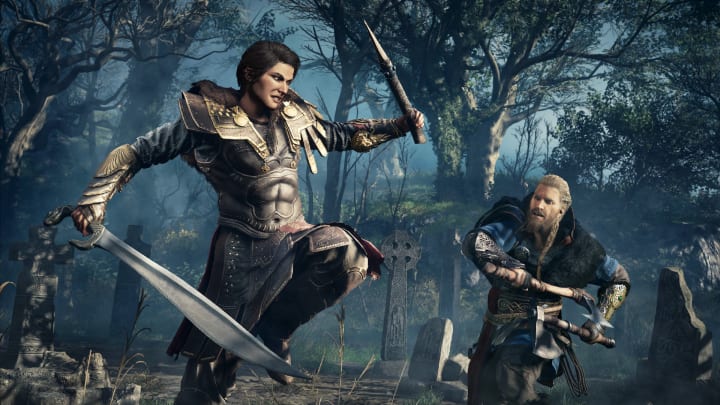Assassin's Creed Valhalla Hits $1B Revenue as Ubisoft Talks Acquisitions

Assassin's Creed Valhalla is now the first game in the franchise to have made more than $1 billion in revenue, Ubisoft announced Thursday. It reaches that milestone as Ubisoft mulls over the possibility of an acquisition in the wake of major buys from Microsoft and Sony.
Valhalla was released in late 2020, and has proven among the most popular Assassin's Creed games ever released. It's also received more post-launch content than previous entries, increasing its revenue-generating lifespan. In addition to expansions that sent players to new maps in Ireland and Paris, Ubisoft's first year of support added free seasonal events and challenge-based game modes, cosmetics available for purchase, and new weapons, armor, mounts and ship skins.
When AC Origins launched, I noticed Ubisoft promoting increased average playing time as a metric of success
— Stephen Totilo (@stephentotilo) February 18, 2022
Their games have gotten longer--and in-game spending risen, too
Yesterday, they said Far Cry 6 time/spending > FC5, and Riders Republic > Steep https://t.co/tTprhGz5Yk
That support continued in Valhalla second's year post-launch. Ubisoft added a crossover DLC to Odyssey, a previous Assassin's Creed game, and will release the Norse myth-focused Dawn of Ragnarök DLC to the game in March.
"Ubisoft's assets have never been so strong at a time when the value of assets has never been so high," the publisher told investors Thursday (H/T Eurogamer). The company, founded by the Guillemot family in 1986 and run by Yves Guillemot, remains protective of its independence. It even fought off a takeover attempt by the French conglomerate Vivendi in 2016.
But Guillemot's comments around acquisition Thursday struck a decidedly more conciliatory tone.
"We have always taken our decisions in the interest of our stakeholders, which are our players, employees and shareholders," he said. "So Ubisoft can remain independent. We have the talent, the industrial and the financial scale, and a large portfolio of powerful IP...
"Having said that, if there were an offer to buy us, the board of directors would of course review it in the interest of all stakeholders."
Ubisoft has been a hotbed of controversy around workplace discrimination in the past couple of years. Major executives have been pushed out over their conduct, and employees at the company continue to push for further improvements.
Activision Blizzard is under similar, if not worse, pressures, but that didn't stop Microsoft from announcing plans to acquire it for close to $70 billion last month. It could be Guillemot is following embattled Activision CEO Bobby Kotick's example and eyeing his own way out.
For now, Ubisoft doesn't appear in imminent danger of sale. But it sounds like Guillemot's leaving the door open.